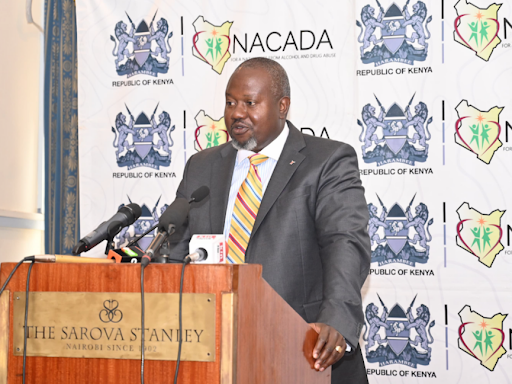 Nacada CEO Anthony Omerikwa
Nacada CEO Anthony Omerikwa
The National Authority for the Campaign Against Alcohol and Drug Abuse (Nacada) has told off musician and influencer Bien-Aime Baraza.
This follows his concern on the recent directive by Nacada on measures to fight rising alcohol and drug abuse among the youth.
Nacada is set to raise the legal drinking age in Kenya from 18 to 21 as part of new measures to fight alcohol and drug abuse.
The policy introduces a series of reforms targeting alcohol access, marketing and distribution across the country.
In a statement on his Instagram stories, Bien protested the new directives, saying the move is censorship.
He said the directives affect the creative and advertising industry, set to affect the youth.
“Nacada now proposes banning alcohol advertising, online sales and wants to change the legal drinking age to 21. The government recently banned advertising of betting. These bans affect the creative and advertising industries heavily,” Bien said in a statement on Monday.
“What is this fake morality? Pretending to care about the very youth they're killing. Are we the first country to have these vices? Then we wonder why unemployment is so rampant!”
Nacada thanked him for sharing his concerns, saying they respect their voice and influence in shaping conversations that matter to young Kenyans.
They, however, said it is not about fake morality or censorship but about public health, data-driven prevention, and protecting the same youth we all claim to care about.
“Kenya is facing a real crisis; alcohol is the most abused substance, with first exposure starting as early as 13 years old, not cool, is it? Youth are the primary targets of online, influencer-led alcohol marketing, and this is a fact, right? The burden of addiction is costing families, schools, and our healthcare system dearly, which is again an indisputable fact!” Nacada responded.
Nacada said they are not banning creativity but regulating access and exposure, where it blurs the line between lifestyle and addiction.
Just like countries regulate tobacco and prescription drug advertisements, Nacada said, alcohol isn’t just another product.
“It has consequences, and with visibility comes responsibility. We also agree with you: unemployment is a national concern. That’s why we’re working with county governments and partners to create treatment jobs, prevention programs, peer mentorship roles, and youth-led media projects that shift the narrative without harming lives,” Nacada said.
Nacada said it is not a war against the creative industry but a call for everyone, artists, marketers, and policy makers, to co-create a culture where talent thrives, and youth don’t have to choose between economic survival and public harm.
The Authority further stated that they are open to having the conversation around it and dialogue.
Among
the key changes is a ban on all forms of online alcohol sales, including
through mobile apps and vending machines.
The government
also plans to shut down the home delivery of alcohol, which has been blamed for
making it easier for minors to access alcohol.
“The online
space has become a loophole. Teenagers are ordering alcohol from their phones
and getting it delivered to their homes. This must stop,” Nacada said.
The policy
will also introduce strict zoning regulations that prevent alcohol outlets from
operating near schools, churches, or residential areas.
Celebrities will no longer be allowed to advertise or promote alcohol brands. In addition, alcohol adverts will also be prohibited during children’s TV programmes, school events, and national holidays.
















